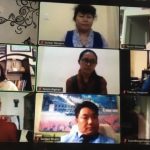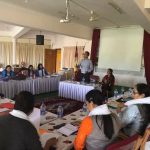The Department of Education (DOE) supports key basic education strengthening priorities of the CTA, and providing access to higher education. The core areas of focus are: early grade reading skills; training and professional development for teachers and educators; science and math education; implementation of the CTA’s basic education policy, and scholarships.
Early Grade Reading Skills Improvement: Although Tibetan is the medium of instruction in Tibetan primary schools many children do not attain adequate levels of reading comprehension in their mother tongue, reducing their ability to acquire other skills and knowledge at later ages. Reading and reading-related activities are generally not scheduled as part of the daily curriculum and access to grade-appropriate, high quality reading materials is extremely limited. To address these challenges DOE introduced the Tibetan Early Grade Reading (TEGR) program in 2013, a multi-component initiative that has supported production of the first Tibetan language graded reading series; Tibetan translations of high quality children’s books; installation of classroom reading corners with grade-appropriate Tibetan reading materials; EGR training and mentoring for primary teachers and librarians; improvement of school library collections; EGR workshops for parents; and design of an assessment tool to measure improvement in early grade reading skills.
Teachers and Educators Training and Professional Development: DOE’s efforts here include a pre-service teacher training course, teacher reading corners for school-based professional development, a 20-month pre- service training course for pre-primary teachers, a sensorial teaching aids program in five pre-primary schools, and new Tibetan-medium math textbooks for grades 6-7.
Basic Education Policy Strengthening: DOE is committed to further strengthening the implementation of its basic education policy (BEP). Programs include physical renovations to schools and thereby making them more BEP-friendly, strengthening the teaching and learning of Tibetan language, and BEP awareness activities.
Access to Higher Education: Despite universal access to basic education and high enrollment rates in Tibetan schools, access to tertiary education remains a major challenge for the approximately 1,200 students who graduate from Tibetan schools each year. DOE provides over 600 new scholarships each year to enable Tibetan college and graduate students’ access higher education. It introduced a new merit-based system that increased incentives for students to improve their performance on national board exams. The Department also provides test preparation coaching for secondary students to prepare for national board exams and competitive medical and engineering school exams.
Counseling: The DOE has a guidance and counseling section which provides services to students and parents of Central Tibetan School Administration and Sambhota Tibetan School Society schools. The program framework is adapted from the ASCA National Comprehensive Counseling & Guidance Model and includes personal/ social development, academic development, and career development. Topics covered includes decision- making, life-long learning, goal setting, time and task management and employment seeking skills. The program has zonal offices and staff in South (Mundgod) and North East (Darjeeling) India





